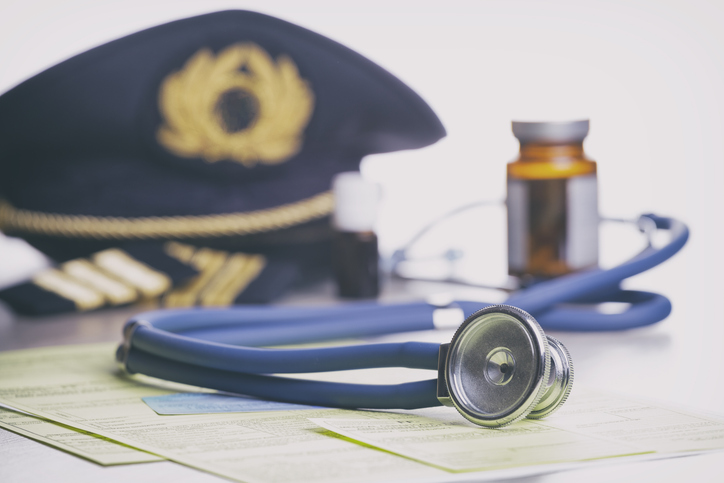
Knowing when you need FAA medical help and when you don’t, can be hard to determine. Will this medication ground me? Will this medical history keep me from obtaining my FAA history? Our firm knows too well that there is a lot riding on your need to be issued your medical certificate when you go for your FAA examination with an Aviation Medical Examiner (“AME”). Even if you don’t need your FAA medical certificate for your livelihood, not being able to obtain your FAA medical certificate can effectively destroy your freedom to fly. For this reason, our firm is sensitive to the idea that no matter how insignificant your medical history may seem, you may want the peace of mind that comes with consulting a professional for FAA medical help. While we appreciate that there are resources available online through the FAA’s website, aviation forums, and even podcasts such as our firm’s podcast, The Pilot Lawyer Podcast, nothing offers peace of mind like knowing that your unique set of circumstances have been considered, analyzed, and discussed with a professional. Doing so means that you aren’t taking any chances of giving up your livelihood or your freedom to fly.
The forgoing is to say that our firm generally encourages airmen to seek consultation with an aviation attorney when there has been any type of intervening medical history or medication changes subsequent to last examination with an AME or before your first FAA medical examination, if you’ve never applied before.
As we have said before, the FAA medical certification process is a regulatory process – it is not a clinical process. In other words, what may make sense to doctors in the real world from a clinical perspective, may not make any difference to the FAA from a regulatory perspective. This is so because when you apply for an airman medical certificate, you are being judged against a certain set of legal criteria (14 Code of Federal Regulations Part 67). The FAA’s interpretation of this legal criteria is always in some state of flux. In other words, medications are regularly being considered and reconsidered for aeromedical significance, policies on certain medical conditions change, and interpretations of how individuals may meet the regulatory requirements for FAA medical certification are regularly being updated and sometimes changed. So, to ensure that your medical history has not fallen outside the scope of meeting regulatory criteria or that there are not efforts you can take to more easily maneuver within the unchanged regulatory practices, it would be wise to speak with an aviation attorney who is staying up to date with regulatory requirements as it relates to your circumstances.
Preparation for an examination with your AME and submission of the appropriate documents to support your eligibility will be key to your success. Many times, the FAA medical help that you need can be as simple as knowing whether your medication is disqualifying or whether you should have your doctor prepare a letter in advance of your AME appointment. There are going to be cases, however, where seeking FAA medical help from an aviation attorney is absolutely critical, such as cases involving mental health concerns, head injuries, receipt of disability benefits, and so on. Cases where you have received correspondence from the FAA, where you have failed to report medical history to the FAA, or if you have already been denied are almost always worthy of consultation with an aviation attorney so that you know what the best next step should be in your case.
Some have been critical of aviation attorneys being involved with FAA medical help. There are two false narratives perpetuated by others offering FAA medical help. The first falsehood is that if you get an aviation attorney involved with your FAA medical help, the FAA will automatically get their attorneys involved. This is false. The only time the FAA will get their attorneys involved in your FAA medical situation is when you have appealed a decision and initiated litigation on a denial or revocation of your medical certificate. Otherwise, when an aviation attorney is providing you FAA medical help, your attorney is engaging directly with the Office of Aerospace Medicine.
The second falsehood is that FAA medical help should only be provided by doctors in a “doctor to doctor” setting. This premise suggests that attorneys aren’t capable of taking complex medical evidence and reducing it to a lucid, intelligent, well-thought-out presentation of why your medical history is consistent with the regulatory requirements for medical certification. We have even heard it posed this way: would you hire a physician to represent you during an interrogation with the police? No, you would hire a lawyer. The thought process behind the analogy is that you should hire a physician to talk to a physician at the FAA. Nevertheless, that logic doesn’t play very well, however, because if that were the case, you would hire another police officer to talk to the police officer that arrested you. Physicians disagree a lot, do they not? Unfortunately, the idea that you shouldn’t hire an aviation attorney for your FAA medical help is just a marketing ploy. The fact of the matter is that AMEs answer to the FAA. Your aviation attorney answers to you. Attorneys can consult with you in an privileged capacity, unlike physicians, about your medical history and how your medical history falls within the FAA’s regulatory criteria for FAA medical certification. Presenting medical evidence with an eye toward the regulatory requirements is the FAA medical help you need and deserve.
Nevertheless, if you need FAA medical help, we want you to reach out to whomever you think is most suited to help you. A few simple questions that you can ask yourself when considering whether to get FAA medical help are as follows:
- Have I had any new medical history since my last FAA medical application?
- Have I started any new medications since my last FAA medical application?
- Have I visited any new doctors since my last FAA medical application?
If yes to either one, you then need to triage the level of severity of the condition. For example, if you went to the doctor for a cold, this is likely not something for which you need FAA medical help. If you have started a new mental health medication, however, you should consider getting a consultation for FAA medical help.
Contact the Aviation Lawyers from The Ison Law Firm Aviation Lawyers for Help Today
You need both a pilot and a lawyer on your side for your aviation law needs. Don’t hesitate to contact our team from The Ison Law Firm Aviation Lawyers to schedule a confidential consultation with an experienced aviation lawyer today.
We’re pilots representing pilots. The Ison Law Firm Aviation Lawyers offers FAA enforcement defense and medical certification representation worldwide!
The Ison Law Firm Aviation Lawyers
Phone: Toll-Free 855-322-1215
Office Hours: Mon – Thu, 9:00 AM to 5:00 PM
Fri, 9:00 AM to 12:00 PM
Disclaimer: Messages left for attorneys after these business hours will be addressed the following business day, during business hours.

